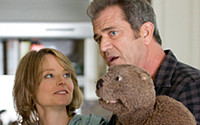
scr Kyle Killen
prd Steve Golin, Keith Redmon, Ann Ruark
with Mel Gibson, Jodie Foster, Anton Yelchin, Jennifer Lawrence, Riley Thomas Stewart, Cherry Jones, Zachary Booth, Michael Rivera, Jeff Corbett, Baylen Thomas, Sam Breslin Wright, Kelly Coffield Park
release US 6.May.11, UK 17.Jun.11
11/US Summit 1h31

Talk to the hand: Foster, Gibson and friend



CANNES FILM FESTIVAL
 While there are too many carefully constructed moments in this film, it's a remarkably effective mixture of dark drama and absurd comedy. This is surprising because the premise is more than a little ridiculous.
While there are too many carefully constructed moments in this film, it's a remarkably effective mixture of dark drama and absurd comedy. This is surprising because the premise is more than a little ridiculous.
After a nervous breakdown, Walter (Gibson) is struggling to get back into his role as CEO of a toy company, husband to Meredith (Foster) and father to two boys, smart 17-year-old Porter (Yelchin) and curious young Henry (Stewart). When Walter finds a beaver puppet, he has an epiphany, letting the beaver say what he's afraid to say. While this helps reinvigorate his business and adds a lively twist to his family life, it's not exactly a permanent solution. Especially when the beaver starts taking over.
Making a movie about mental illness is tricky, and writer Killen bravely stirs in cinematic genres from broad slapstick to freak-out horror. So it's fascinating that the film not only holds our interest, but draws us into the situation. We're both sceptical and engaged, which means we have the same reaction as everyone does to Walter: bemusement, nervous apprehension, fear.
Gibson is superb in a difficult role, letting us see glimpses of the frightened-boy inside even as the beaver has another foul-mouthed rant in his odd Michael Caine accent. And his interaction with the always-excellent Foster and the wide-eyed Stewart is terrific. Meanwhile, Yelchin gets a major subplot as Porter agrees to write the valedictory speech for a popular girl (Lawrence), then finds himself embarking on an unexpected relationship even as he tries to eliminate all traces of his father's mannerisms in himself. Which of course he can't do.
As the film progresses, this father-son aspect emerges as the primary theme. As a director, Foster continually highlights their similarities through rather obvious direction and editing. But she also draws out a bleaker element through this family's suicidal history, and what that might mean to Walter, Porter and even possibly Henry. So by the end, the film has shifted from wacky comedy to lively romance to creepy thriller to heavy drama. And the ultimate message is simple and potent: all of us are crazy when we pretend that everything is fine.
 |
themes, language, sexuality | 7.Jun.11 |

 Still waiting for your comments ... don't be shy.
Still waiting for your comments ... don't be shy.
HOME | REVIEWS | NEWS | FESTIVAL | AWARDS | Q&A | ABOUT | TALKBACK